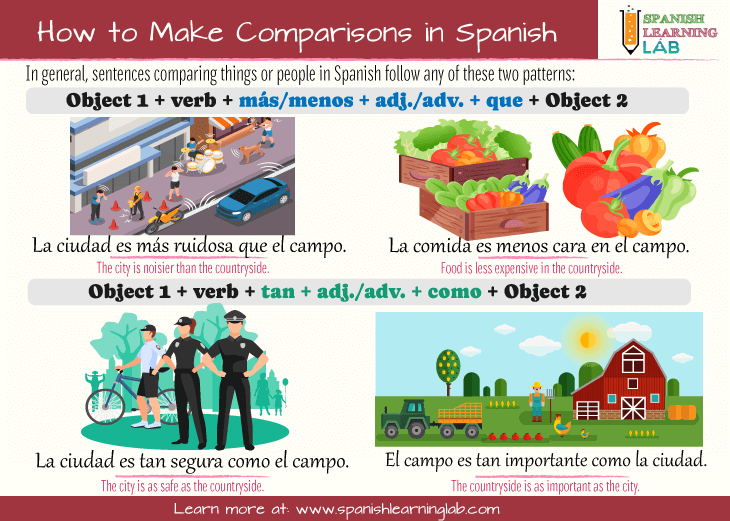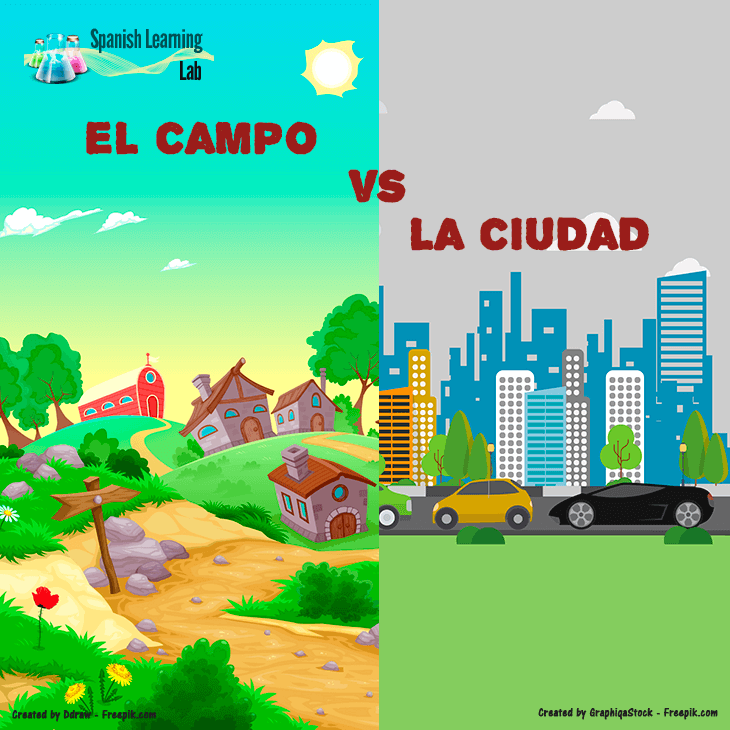¡Hola! Welcome to a new lesson for listening practice. This time, we will compare life in the city with life in the countryside. This lesson includes several examples of comparisons of equality and inequality about things such as traffic, environment, job opportunities and others that we discuss when we are making comparisons in Spanish. More importantly, you will have the chance to practice the vocabulary and grammar with two listening activities and their respective interactive quizzes. Let’s start…
Comparisons of equality and inequality in Spanish
In order to make comparisons of inequality in Spanish, you must add the words “MÁS” (more) and “MENOS” (less) before adjectives like “inteligente” or “ruidoso”, for example: “Más inteligente” and “Menos ruidoso”. Besides any of those two words, we must add the particle “QUE” (than) before a second object. This way, we will often follow the sentence structure below to make comparisons in Spanish:
1st object + SER or another verb + MÁS/MENOS + Adjective + QUE + 2nd object
By using that structure, a comparison like “People are friendlier in the countryside than in the city” could be translated almost literally as “Las personas son más amistosas en el campo que en la ciudad”, where the word “amistoso” is the main adjective and must agree in number and gender with the noun “persona”. Regarding comparisons of equality in Spanish, we will use “TAN… COMO” meaning just the same as the structure “AS…. AS” from the English language. Following this structure, we can make comparisons in Spanish such as: “La vida en el campo es tan entretenida como la vida en la ciudad” (Life in the countryside is as entertained as life in the city). Here are some illustrated examples showing how you could use any of these structures to compare the countryside and the city or other kinds of things in Spanish:

Sentences comparing life in the city and the countryside in Spanish
Here are some basic sentences related to pros and cons of living in the city as opposed to living in the countryside in Spanish. Some of these examples will give many details to make for advanced comparisons in Spanish, especially things that you might hear in a real conversation about this topic. Notice that the clause “QUE + second object” is optional, so it was left out in some sentences.
|
Conveniencia – En la ciudad es más fácil conseguir cualquier cosa que en el campo.
Convenience – In the city, it is easier to get anything than in the countryside.
|
|
Transporte – El transporte es mejor en la ciudad que en el campo.
Transportation – Transportation is better in the city than in the countryside.
|
|
Tecnología – La tecnología es más importante en la ciudad.
Technology – Technology is more important in the city.
|
|
Trabajo – Hay más oportunidades de trabajo en la ciudad.
Work – There are more job opportunities in the city.
|
|
Ambiente – El medio ambiente es más bonito en el campo que en la ciudad.
Environment – The environment is more beautiful in the countryside than in the city.
|
|
Contaminación – Hay menos contaminación en el campo.
Pollution – There is less pollution in the country.
|
|
Estrés – La vida en el campo es más tranquila y menos estresante
Stress – Life in the countryside is calmer and less stressful
|
|
Seguridad – En algunos países, es más seguro el campo que la ciudad.
Security – In some countries, the countryside is safer than the city.
|
|
Comunicación – La comunicación entre personas es peor en las áreas rurales debido a la distancia entre las casas.
Communication – Communication between people is worse in rural areas due to the distance between the houses.
|
|
Socialización – Las personas de la ciudad tienen más oportunidades de socializar que las personas del campo.
Socialization – People in the city have more opportunities to socialize than people in the countryside.
|
|
Ruido – Las ciudades son muy ruidosas en comparación con el campo.
Noise – Cities are very noisy compared to the countryside.
|
|
Cultura – El campo es tan rico en cultura como la ciudad.
Culture – The countryside is as rich in culture as the city.
|
|
Tráfico – El tráfico es mucho más terrible en la ciudad.
Traffic – Traffic is much more terrible in the city.
|
|
Entretenimiento – Hay menos opciones de entretenimiento en el campo.
Entertainment – There are less entertainment options in the country.
|
|
Gastos – La vida es más cara en la ciudad que en el campo.
Expenses – Life is more expensive in the city than in the countryside.
|
Comparing life in the city with life in the countryside in Spanish
In this section, you will be able to read and listen to two comparisons with perspectives on life in the city with life in the countryside in Spanish. These examples, plus the ones above, will serve as the basis for both listening activities in this lesson. Please analyze the first example carefully:

La ciudad es mejor que el campo
La ciudad es mejor que el campo simplemente porque todo está al alcance con más facilidad. No es necesario sembrar o criar animales. Solo tenemos que ir al supermercado y comprar todo lo que necesitamos. Además, hay más oportunidades de trabajo en la ciudad y los salarios son mucho mejores que en el campo. Otro beneficio es el transporte. Hay muchas formas de moverse en la ciudad como trenes, metro, buses, taxis y tu propio auto. Por último, el acceso a la tecnología es mejor en la ciudad y la tecnología es muy importante hoy en día. Por estas razones, prefiero la ciudad al campo.
In the previous example, the person probably lives in a developed city with good transport and other good conditions. This is not the case for all cities in the world, especially in developing countries. In fact, what we call “countryside” in Latin American countries can be quite different as compared to the countryside in the United States, for instance. The following example includes more comparisons in Spanish, this time focusing on the countryside and a city (or town) in a developing country.
El campo es mejor que la ciudad
Para mí, el campo es mejor que la ciudad. Las ciudades son muy ruidosas y algunas veces son peligrosas. En el campo, la gente es más amigable y siempre hay alguien con quien conversar y pasar un momento agradable. En algunas comunidades rurales, el agua, las carreteras y el acceso a suministros básicos pueden ser un desafío para las personas. En ese sentido, la ciudad es mejor que el campo. Sin embargo, la comida es más barata en el campo porque es donde se produce todo lo que se consume en la ciudad. Además, el aire es limpio y el clima es muy agradable la mayoría del tiempo. A pesar de las dificultades, incluso en los pueblos más pobres hay una especie de optimismo y amabilidad que separa la vida en la ciudad de la vida en el campo.
Listening Activity No. 1: The city vs the country in Spanish
Listening Activity No. 2: Comparing places in Spanish
Key expressions in the conversation:
- “Ventajas y desventajas…” means “Advantages and disadvantages”
- “Aún así, siento que…” means “Even then, I feel like…”
- “Te aseguro que…” means “I can assure you that…”
- “Todo en su momento” means “All in good time”
We got to the end of this lesson. We hope that you were able to get the best out of the examples, especially some clues on the way you can make comparisons in Spanish to talk about cities, towns, the country or any other topic of your interest. Keep practicing with us! ¡Hasta la próxima!
